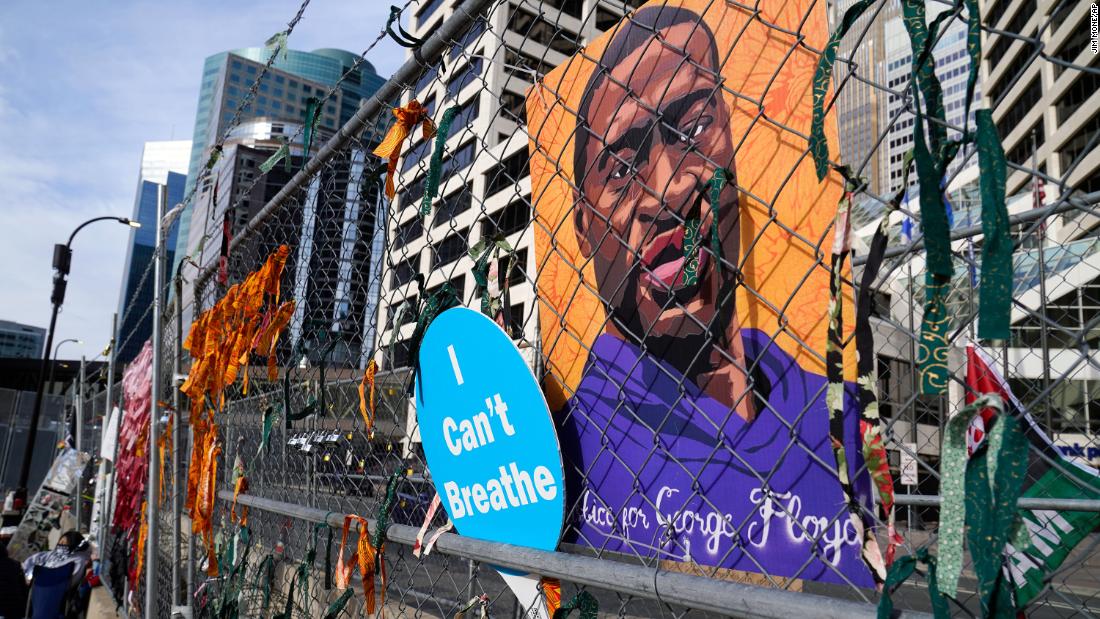
"When I look at George Floyd, ... I look at my dad. I look at my brothers. I look at my cousins, my uncles because they are all Black. I have a Black father. I have a Black brother. I have Black friends. And I look at that and I look at how that could have been one of them," Darnella Frazier testified Tuesday.
Frazier, who came upon the men while going to Cup Foods, was identified in court only by her first name, but she has been internationally recognized for her decision to record and share the video.
Her testimony highlights why Floyd's death last summer sparked self-reflection among Black Americans and motivated many others to join massive protests against police brutality. Her words were a reminder that Floyd represents the burden of being Black in America.
He was a father
As the trial began earlier this week, some of Floyd's relatives and attorneys said he is deeply missed by his daughter.
"We can't get George Floyd back. But what we can do is make sure that no family feels this pain and suffering that we feel," Floyd's nephew Brandon Williams said Monday. "His daughter won't have a father in her life."
Weeks after Floyd's death, a video of his daughter captured the attention of people across the country.
"My daddy changed the world," Gianna Floyd says in a video posted last summer by Floyd's close friend, NBA player Stephen Jackson. "Daddy changed the world."
More than 40 years before Floyd's death, another young Black girl lost her father during an encounter with police.
Arthur Miller, a Black businessman and community leader, was choked to death by NYPD officers in June 1978. His daughter, LoLisa Miller-Bradford, said that watching Floyd's death on television brought memories of her childhood and the death of her father.
"When I saw that video, I just cried," Miller-Bradford told CNN. "I cried because I heard he had a daughter and I never want any child to experience what LoLisa, the little 8-year-old, had to experience."
He was a brother
While Floyd became a cause for many people across the country, his brother still sees him as just his sibling.
"To everybody else, it was a case and a cause," Philonise Floyd told CNN's Alisyn Camerota on Tuesday.
"To me, it was my brother, somebody that I grew up with, eating with, sleeping in the same bed with, going fishing with, just watching him dance with my mother. Those are the things that I think about when I think about my brother. He was a protector, he was someone who we can go to when we were in trouble and in need of anything," Floyd added.
Philonise Floyd has previously said his brother was "one of the many black men and women that have been murdered by police in recent years."
"You watched my brother die. That could have been me. I am my brother's keeper," he said in a video message to the United Nations Human Rights Council last year.
He 'could have been me'
As pain and anger poured through communities after images of Floyd's last moments circulated online, athletes, politicians and many others spoke up showing that the 46-year-old was not an arbitrary figure.
The first thought that went through Christian Taylor's mind after watching the video of Floyd's death was: "That could've been me."
"That is the difficult situation because when you think of what he was doing or how he was going about it, then that is not very different to me going to a store," the two-time Olympic gold medal winner told CNN last year.
Four black leaders among the largest 500 companies in the United States said Floyd's death was "personal" and they could have just as easily been Floyd.
Experts said Floyd's killing also helped humanize Black people in the minds of White people.
"George Floyd turned Black men into human beings for White people, and he did that by calling out for his mother," Janet Helms, a Boston College professor of counseling and psychology, has told CNN. "Covid made White people sit and look at the murder of George Floyd. They couldn't get away from it, especially White women. ... They became aware they were allowing this to happen."
Chauvin's trial began earlier this week. The former police officer has pleaded not guilty to second-degree unintentional murder and second-degree manslaughter charges. He has also pleaded not guilty to third-degree murder, which was reinstated March 11.
The case is not centered in whether race was a factor.
Still, during the process to select a jury of 14 people, the defense generally used its strikes on people who expressed negative views of Chauvin and positive views of Black Lives Matter. Meanwhile, the prosecution generally used its strikes on White people who expressed support for police.
"news" - Google News
March 31, 2021 at 08:48AM
https://ift.tt/3rAGwCT
Chauvin trial witness sums up what George Floyd means for Black people in America - CNN
"news" - Google News
https://ift.tt/2DACPId
https://ift.tt/2Wh3f9n
Bagikan Berita Ini














0 Response to "Chauvin trial witness sums up what George Floyd means for Black people in America - CNN"
Post a Comment